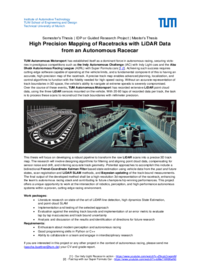LiDAR High Precision offline Mapping of Racetracks
- Institut
- Lehrstuhl für Fahrzeugtechnik
- Typ
- Semesterarbeit Masterarbeit
- Inhalt
- experimentell theoretisch
- Beschreibung
TUM Autonomous Motorsport has established itself as a dominant force in autonomous racing, securing victo-
ries in prestigious competitions such as the Indy Autonomous Challenge (IAC) with Indy Light cars and the Abu
Dhabi Autonomous Racing League (A2RL) with Super Formula cars. Achieving such success requires
cutting-edge software capable of operating at the vehicle limits, and a fundamental component of this is having an
accurate, high-precision map of the racetrack. A precise track map enables advanced planning, localization, and
control algorithms to function with the fidelity needed for high-speed racing. Without an accurate representation of
track boundaries in 3D space, the vehicle's ability to navigate at extreme speeds is severely compromised.
Over the course of these events, TUM Autonomous Motorsport has recorded extensive LiDAR point cloud
data, using the three LiDAR sensors mounted on the vehicle. With 20-60 laps of recorded data per track, the task
is to process these scans to reconstruct the track boundaries with millimeter precision.
This thesis will focus on developing a robust pipeline to transform the raw LiDAR scans into a precise 3D track
map. The research will involve designing algorithms for filtering and aligning point cloud data, compensating for
sensor noise and drift, and inferring accurate track geometry. Potential approaches to accomplish this include a
bidirectional Frenet-Coordinate Kalman Filter based state estimation using vehicle data from the past and future
states, scan registration and LiDAR SLAM methods, and Bayesian updating of the track-bound measurements.
The final output of the developed method shall be a high-resolution 3d representation of the racetrack, enhancing
the team’s autonomous racing stack and contributing to future championship-winning performances. This project
offers a unique opportunity to work at the intersection of robotics, perception, and high-performance autonomous
systems within a proven, cutting-edge racing environment.- Voraussetzungen
• Enthusiasm about modern perception and autonomous racing
• Good programming skills in Python or C++
• Ability to collaborate in a team and engage in interdisciplinary research- Tags
- FTM Studienarbeit, FTM Automatisiertes Fahren, FTM Buettner, FTM Informatik
- Möglicher Beginn
- sofort
- Kontakt
-
Sascha Büttner, M.Sc.
sascha.buettnertum.de - Ausschreibung
-
